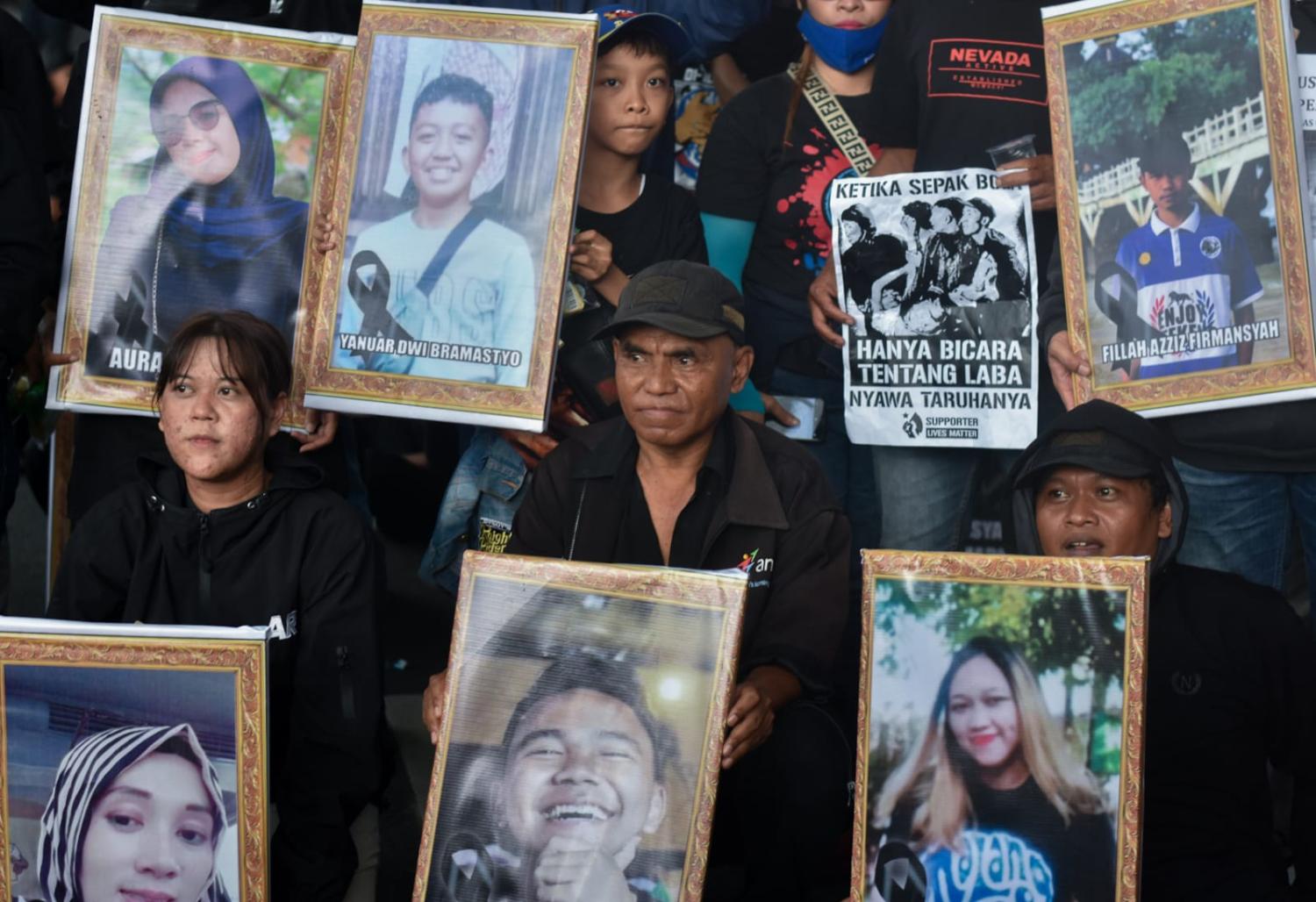Malang won’t stop grieving, defiantly and messily. Normally this would rile authorities, but their tolerance of the banners of hate draping the historic East Java city suggests Indonesia’s democracy hasn’t sickened so badly as critics claim.
Six weeks after one of the world’s worst stadium disasters, crude signs slamming the police for the deaths of 135 soccer fans – including 33 children – still hang from overpasses and trees.
In the province’s second-biggest city, even the walls of the local legislature stay defaced. So do police boxes at traffic intersections pasted with handbills.
Those in English decry the police with profanity and shout We hate Cops! The majority, hand-painted on black shrouds, shriek in red lettering: Usut Tuntas. The translation “investigate thoroughly” lacks the anguish of the original. The mourners say their real message is telling the police: Get your act together!
How many countries would tolerate such blatant challenges to power?
Though some pain relief is expected, heavy medication to fix the disease of police impunity is unlikely. The cancers rotting the political body of the world’s third-largest democracy are well lodged and could metastasise.
“Malang” also translates as “unfortunate”, a meaning that has come to pass. The normally pretty and green hill town is ugly and angry. Unmoored streamers, soaked by heavy afternoon rains and ripped by winds, add to the bleakness.
Last Thursday, 10 November, marked 40 days after the stampede at the Kanjuruhan Stadium.
It was also Hari Pahlawan (Heroes Day), recalling the 1945 Battle of Surabaya against British troops trying to reinstate Dutch colonial control of the provincial capital. The bravery of teens armed with bamboo spears fighting for the new republic has become Indonesia’s birth-of-nation legend.
This month, tens of thousands closed Malang streets to commemorate both events, one with pride, the other with anger. They shouted: We want justice, then laid 135 black biers, many with victims’ photos, around a circular central park before the City Hall.
The stadium calamity erupted on the evening of 1 October when upset local supporters invaded the pitch after their team Arema lost 3-2 to its bitter rival Persebaya Surabaya.
Although the first fence-jumpers weren’t violent, police overreacted. Videos taken from phones seem to show tear gas grenades fired directly into the overcrowded stands. Under this chemical assault, throngs rushed to the stairs and gates, with some reportedly not fully open. Scores were trampled, crushed, asphyxiated.
The result could have been foreseen, but this was a shoot-first-think-later response to a minor disorder.
The Fédération Internationale de Football Association bans gas at games. Malang match organisers later said they didn’t know of the regulation. Despite this, FIFA hasn’t sanctioned Indonesia.
Reuters reported the government demoted or suspended several officers controlling stadium security. The arena will be demolished and other grounds audited for safety. President Joko “Jokowi” Widodo has launched a “fact-finding team”. This is one of at least five inquiries, some being run by the police.
The heartfelt loathing on Malang’s streets is understandable and worrying. Trust in the impartial delivery of law and order is essential for the just operation of civil society.
The police in Indonesia, estimated to number more than 450,000, have slowly become more professional since splitting from the army early this century, but remain infamous for their “scandals, violence and corruption” according to Murdoch University lecturer Jacqui Baker. Widodo claimed that before the Kanjuruhan tragedy, public trust had risen to 80 per cent. That statistic is suspect. Baker, speaking on a recent podcast, asserted that many see the police as “parasitic, predatory actors” who don’t provide the services people need.
In a staged show of resolve before a room sweating with 559 top cops, Widodo demanded more professionalism and accountability. He also told them not to show off their wealth because it aroused envy, raising the awkward question: How can any officer get hyper-rich legitimately when the reported median monthly salary is Rp 7.83 million (A$755)?
Baker, who says there’s a crisis of policing in much of the world, was unimpressed with Widodo’s speech because the core issues of corruption, military involvement, independent oversight and separation of services were not addressed. Indonesian police run their own forensic labs and hospitals. They control post-mortems so decide what information gets released. Baker suggests a public coroner should determine causes of death.
The smell that wasn’t ventilated in the president’s harangue is the rot of pungli, an informal system of illegal levies for promotions and favours. Despite clear signs of the need for a top-to-bottom cure, Baker remains sceptical: “The government wants to move on … discussion of justice reform is at a dead end.”
Sufferance of Malang’s wrath may make Indonesia’s democracy look fit, though its heart needs attention; the rule of law sickens because its carers won’t listen to the people’s voice, increasingly shrill.

